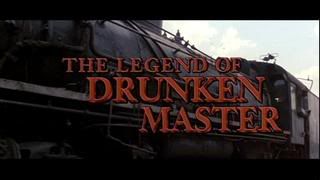
Wong Fei Hung is certainly the most visible "character" in all of martial arts films, though his portrayal varies widely and often take great liberties with what is known about the man. Still, his influence is far-reaching, and many of the great martial arts classics, from Once Upon A Time In China to Fist Of Legend to Magnificent Butcher, have shown massive influence from Fei Hung. It was 1978's Drunken Master that added drunken boxing to the martial arts master's repertoire, and paved the way for Jackie Chan becoming one of the biggest stars in the world.
Fourteen years (and many massive hits) later, Jackie decided to return to the character that made him famous and, along with director Chia-Liang Liu (a martial arts legend in his own right), decided to take martial arts film-making to a new level. The depth of choreography and physicality on display has rarely been rivaled, and Drunken Master II remains what many (including myself) consider Jackie Chan's peak as an actor and martial artist.
And perhaps as filmmaker...
It's often suggested that Jackie Chan had a large part to play in the direction of the film, and Chia-Liang Liu's disappointing Drunken Master III would certainly support this theory. That said, Chia-Liang Liu deserves credit for his contribution both as director and for his role as General Fu Wen-Chi and his incredible fight with Jackie under the train near the beginning of the film.
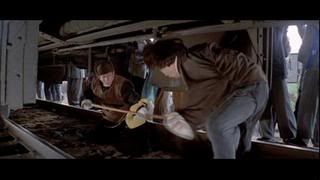
Speaking of incredible fights, one would have difficulty finding a fight in this film that is not memorable. Fei-hung and General Fu Wen-Chi vs The Axe Gang, Fei-hung drunkenly fending off purse snatchers, and the legendary climactic fight between Fei-Hung and John (played by Jackie's real-life bodyguard, the high kicking Ken Lo) are just some of the memorable encounters. The fights are hard hitting, acrobatic, original and include some jaw-dropping choreography.
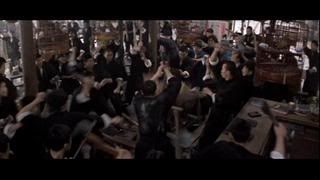
Thankfully there's also a servicable (though fiercely nationalistic) story to go along with the action set pieces. The "young" Fei-hung (played by the then 40 year old Chan) accidentally finds himself caught up in the smuggling of Chinese artifacts out of the country when he attempts to sneak some Ginseng in the luggage of some wealthy foreigners. It seems the British are stealing Chinese history, and on top of that are just generally snooty and dickish. Who knew?
The snooty brits also have some Chinese on their side in the form of Henry (Ho Sung Pak) and the bespectled John (Ken Lo), who are hired to track down Fei-hung and retrieve the accidentally stolen museum pieces. They do this through extreme violence, and persecuting innocent Chinese steel workers. One memorable scene has the steel workers leaving for the day when Henry orders them back to work. When they attempt to leave anyway, he beats them all senseless! So much for power in a union.
Oh, and luckily Fei-hung is master of the Drunken Boxing fighting style, and is actually a more relaxed (and nigh invulnerable) fighter when intoxicated. This comes in handy in all sorts of ways, particularly in the final scene where he battles the traitorous chinese smugglers in the steel mill.
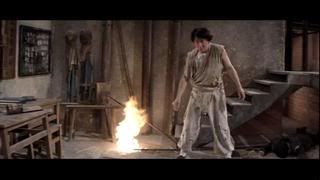
Only three years before the transfer of sovereignty of Hong Kong to China, the apparent British pilfering of Chinese culture was obviously reflected in the plot of this film. While dealing in some rather blatant stereotypes, it's still nice to see a kung-fu film reach for loftier goals than the usual stitched together plot, and it's appropriate material for a folk hero like Fei-hung to appear. Luckily, the plot never gets bogged down in the sometimes serious subject manner.
Some mention should be made of the late, wonderful Anita Mui as Fei-hung's Step-Mother. Serving as more than just comic relief, she steals a number of the scenes she appears in, and gets to show off some impressive kung-fu skills. Lung Ti as Wong's father Wong Kei-ying is also appropriately stern, with enough fatherly love to keep him sympathetic.
Some mention should be made of the late, wonderful Anita Mui as Fei-hung's Step-Mother. Serving as more than just comic relief, she steals a number of the scenes she appears in, and gets to show off some impressive kung-fu skills. Lung Ti as Wong's father Wong Kei-ying is also appropriately stern, with enough fatherly love to keep him sympathetic.
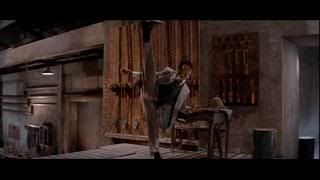
The Dimension release of The Legend Of Drunken Master is presented in its original Anamorphic 2.35:1 aspect ratio. The print shows occasional damage, particularly in the first ten minutes, but after that things calm down and the image quality is a lot better than the VHS bootlegs of the film I remember from the early 90s. Unfortunately (and quite non-sensically) this release only includes an English dub of the film, though Jackie does dub his own voice and it is generally well done. Still, the original audio track would have been welcomed.
It should also be mentioned that compared to other releases of Drunken Master II, The Legend Of Drunken Master is slightly edited, includes a new score, and some sound effects have been changed. It doesn't make much of a difference in the grand scheme of the film, but purists are certainly aware of these things.
The DVD release features a short interview with Jackie that touches on his experiences making the film. Jackie's broken english is quite endearing, but the bits shown are just your usual fluff piece EPK segments. Rounding things off are trailers for Shanghai Noon, Project A, Supercop, Supercop 2, Twin Dragons, Armor Of God, Operation Condor, Fist Of Legend, Twin Warriors, The Enforcer, The Legend, and Crime Story.
Featuring Jackie Chan at the height of his abilities, and a strong story that connects some of the most amazing fights ever put on film, The Legend Of Drunken Master is as good as martial arts films get. The outtakes over the closing credits reveal some of the dangers while filming, but the incredible technique on display will have fans returning to this film again and again.
It should also be mentioned that compared to other releases of Drunken Master II, The Legend Of Drunken Master is slightly edited, includes a new score, and some sound effects have been changed. It doesn't make much of a difference in the grand scheme of the film, but purists are certainly aware of these things.
The DVD release features a short interview with Jackie that touches on his experiences making the film. Jackie's broken english is quite endearing, but the bits shown are just your usual fluff piece EPK segments. Rounding things off are trailers for Shanghai Noon, Project A, Supercop, Supercop 2, Twin Dragons, Armor Of God, Operation Condor, Fist Of Legend, Twin Warriors, The Enforcer, The Legend, and Crime Story.
Featuring Jackie Chan at the height of his abilities, and a strong story that connects some of the most amazing fights ever put on film, The Legend Of Drunken Master is as good as martial arts films get. The outtakes over the closing credits reveal some of the dangers while filming, but the incredible technique on display will have fans returning to this film again and again.










2 comments:
Man, but I cannot give enough love to the fight between Ken Lo and Jackie Chan. It is my second favorite movie fight right behind Roddy Piper and Keith David from They Live.
Most old school gamers tend to nerdgasm when they recognize that Ho Sung Pak (aka Henry) is the same guy that was the body model for Liu Kang in the very first Mortal Kombat video game.
This is the essence of physical comedy.
Post a Comment